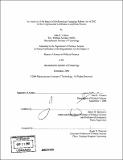| dc.contributor.advisor | James M. Snyder, Jr. | en_US |
| dc.contributor.author | Velasco, John R. (John Richard) | en_US |
| dc.contributor.other | Massachusetts Institute of Technology. Dept. of Political Science. | en_US |
| dc.date.accessioned | 2007-05-16T18:37:11Z | |
| dc.date.available | 2007-05-16T18:37:11Z | |
| dc.date.copyright | 2006 | en_US |
| dc.date.issued | 2006 | en_US |
| dc.identifier.uri | http://hdl.handle.net/1721.1/37437 | |
| dc.description | Thesis (S.M.)--Massachusetts Institute of Technology, Dept. of Political Science, 2006. | en_US |
| dc.description | Includes bibliographical references (leaves 86-89). | en_US |
| dc.description.abstract | With the passage of the 2002 Bipartisan Campaign Reform Act (BCRA), a flurry of research has been conducted on the impact on political parties. However, there exists a gap in the research regarding the impact of the legislation on the role of Members as fundraisers for their parties. What impact did BCRA have on the size and significance of contributions from Members of Congress to party committees and candidates? Furthermore, are Member contributions significant in determining a Member's likelihood of transferring to a committee and is this effect amplified post-BCRA? This thesis provides historical data on the importance of Member contributions from 1996 to 2004 and then turns to determining what, if any, impact financial prowess has on a Member's likelihood to advance upwards in the committee hierarchy. The principal findings of this research are twofold. First, money matters because BCRA cut soft money, therefore political parties have turned to their Members to serve as vital sources of campaign funds. Second, Member contributions do not significantly impact or influence a Member's probability of transferring to a more prestigious committee. | en_US |
| dc.description.abstract | (cont.) In fact, Member contributions were only significant for the Democratic Party in the era prior to BCRA (105th - 108th Congresses). Member's transfer are shown to be more of a tradeoff between opportunities which exist for moving up the committee hierarchy based on available vacancies and opportunity costs exhibited through a Member's current set of committee assignments. Factors such as a Member's seniority in the chamber and their party loyalty voting scores are also important considerations depending on their party affiliation and seniority on their current committee assignments. | en_US |
| dc.description.statementofresponsibility | by John R. Velasco. | en_US |
| dc.format.extent | 115 leaves | en_US |
| dc.language.iso | eng | en_US |
| dc.publisher | Massachusetts Institute of Technology | en_US |
| dc.rights | M.I.T. theses are protected by copyright. They may be viewed from this source for any purpose, but reproduction or distribution in any format is prohibited without written permission. See provided URL for inquiries about permission. | en_US |
| dc.rights.uri | http://dspace.mit.edu/handle/1721.1/7582 | |
| dc.subject | Political Science. | en_US |
| dc.title | An analysis of the impact of the Bipartisan Campaign Reform Act of 2002 on the congressional committee assignment process | en_US |
| dc.type | Thesis | en_US |
| dc.description.degree | S.M. | en_US |
| dc.contributor.department | Massachusetts Institute of Technology. Department of Political Science | |
| dc.identifier.oclc | 123362389 | en_US |
